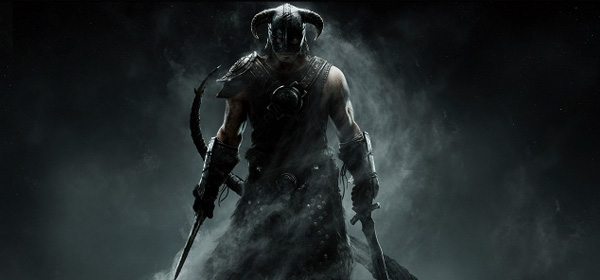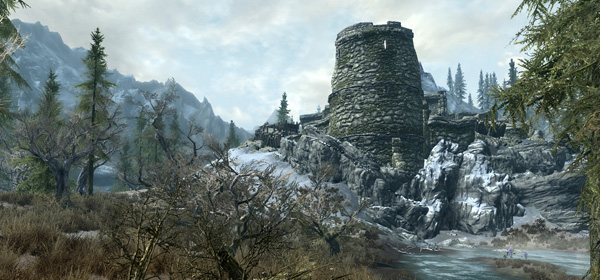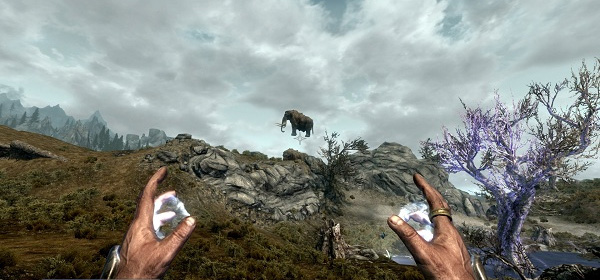
Guest Article : Steven Harbor. Steve now has a blog. Check it out here.
Near the end of 2010, The Elder Scrolls V: Skyrim was announced to unfettered excitement at the Spike Video Game Awards. From the moment the title card showed up on that giant stage screen, Skyrim has had a red carpet rolled out for it in the gaming press every step of the way. It has always been a celebrity, a shining knight that has come to whisk us away on a journey to a far away land in the snowy peaks of northern Tamriel. Almost three months since the first sword was swung, Skyrim now sits high and mighty on its throne, having been adorned with many game of the year nods and near universal acclaim. Many who find themselves out of the loop probably scratch their heads trying to figure out why we spend hundreds of hours plugged in, worshipping at this game’s almighty altar. I have taken it upon myself to make sense of all of the fanfare, explaining in detail what this game does right, what it does wrong, and how it affects the video game industry.
As far as most people are concerned, there is an easy and obvious answer to the question of why the game is so widely cherished and loved. It’s not just a big playground, but a playground that tries to be everything to everyone. At no point in the game will you ever find yourself shoehorned into an archetype, or feel your own freedom of choice being taken away from you. It’s hard not to appreciate the fact that the creators of Skyrim not only made a huge world, but created it so that you will most likely never see more than a small portion of it. Only if you are a gamer that is truly dedicated to gaming as a hobby and spend more than 10 hours a week playing will you ever have a chance to see most of what Bethesda has to offer in this game.
For the past ten years I have watched as every game has been watered down, simplified, shortened, condensed, and packaged in a way that guarantees almost everyone who plays it sees everything the developer wants you to see, in the exact way that they want you to see it. It’s as if they are terrified of the idea of you making any attempt to go off the beaten path to explore, and never seeing the second half of the game. Take Call of Duty for instance. The average campaign of a Call of Duty game is around 5-7 hours long, contains checkpoints at almost every corner, minimal exploration, and achievements that pop up every hour or so to serve as a reminder that you only have so many chapters to complete before you complete the game. Gameplay is simple (point and shoot) and each section is expertly paced, always calculating the exact time your left thumb starts to get tired from making your character walk forward so that the game knows when to place you into a “turret in a helicopter” section. You do not play the campaign so much as you are shoved through it. This type of game development has become somewhat of an art form, with games like Uncharted serving as the front-runners of the pack.

In any other game, this might have been an inaccessible background object
Skyrim is the antithesis to this kind of game design. Bethesda never knew, as their creative teams meticulously placed every tree, rock, and dungeon in the game, when you were going to put the controller down. They never knew which weapons you would use or whether you would even read the game’s countless books. To a publisher like Activision which probably only cares about the bottom line, creating all of those trees, dungeons, and weapons would be seen as nothing more than a waste of development time. Why create something that the player will most likely never even see? The fact that there is so much there that few will see is the true beauty of Skyrim. Simply exploring the world feels like a reward.
There is a lot more still that goes into Skyrim’s success. One of the aspects of the game that I have observed while playing that is not very often described in reviews or the like is its sense of relaxation. Exploring Skyrim is a bit like exploring a vast vacation island where everything is catered to your needs. You feel no urgency to do anything. There are no business calls to answer, there’s no arrow pointing you to where you need to go, and ultimately there are no consequences for your actions. There is a main quest and it does have stakes, but those stakes can be placed on pause at any time so you can go become an arch-mage, or leader of the companions guild, or do nothing at all. That is the great thing about having no urgency. The game lets you do nothing, and more importantly, doing nothing is fun. Just imagine if, while playing a war game, you decided the narrow street you were walking down was boring, and the buildings off in the distance past the alleyway looked more interesting. What if those backgrounds, normally a facade meant to give the illusion of scale and chaos, were fully accessible and yet had nothing to do with the mission you were tasked with? This is the dream that Bethesda set out to accomplish, and despite rough spots here and there, they’ve managed to accomplish it.
Unfortunately for Bethesda, there are indeed rough spots. Skyrim is nothing if not incredibly ambitious, and more so than perhaps any other game, mistakes can fall through the cracks. Bethesda has a storied reputation of releasing games with very little polish. As far as glitches in general go, you can chalk them up to time constraints and not enough hours in the day. Bethesda is a big developer, but Skyrim is a bigger game. I imagine going through this gigantic game world they’ve created and trying to fix each and every bug, even with the help of many play-testers, would be like trying to scrape the gum off every surface in New York. Perhaps it is too much to ask that we receive a polished game, considering it is almost designed to be broken by the players. Even so, it is hard to escape the feeling that you are handling a fragile vase while playing. Any wrong move could cause the whole game to come crashing down like a house of cards, and you never know when the game might decide to collapse in on itself, especially if we are talking about the botched Playstation 3 version.

Some of the glitches are hilarious though
There are more problems than just glitches though. The Elder Scrolls IV: Oblivion was released in early 2006. That was over five years ago, and with all of the time that has passed between titles, Skyrim’s combat system still manages to feel like it is from 2006. The chief issue with the gameplay is that it lacks structure. Skyrim feels like a numbers game. It’s always your numbers versus those of the opponent, and nothing more. The way you get these numbers is by repeating the same action as much as possible. Kill enough enemies with a one-handed sword and your one-handed numbers go up. Sneak around enough without getting caught and your sneaking numbers go up. The game has no way to predict how powerful you are or which abilities you end up favoring for your character, so you are never challenged to fight a certain way.
The decision of how to approach a quest rests on your shoulders, but because the game can never predict how you play the game, the visceral, strategic elements of the gameplay are stripped down to almost nothing. Enemies start to seem like nothing more than punching bags that hit back, each with their own health bar that gradually goes down as you bombard them with whichever tactic you prefer. The enemies will blindly attack you in the same way, hitting you with magic, swords, or arrows, and what results is similar to playing a game of rock-em sock-em robots. You just mindlessly hit the button until either of you falls and the other achieves victory. Stealth has a similar problem, as it is less about how well you maneuver through the shadows than it is about wearing the right boots, walking slowly, and leveling up until that magic number is reached and sneaking becomes a piece of cake. You will never truly feel like a ninja or a master assassin if the only tactic you have in your arsenal is to crouch and walk slowly behind enemies. The anything-goes approach ultimately robs the gameplay of finesse and polish, just like it does for many other aspects of the game.
Perhaps the biggest failure of Skyrim is its complete inability to react to the player’s actions. Todd Howard, the lead director of Skyrim, said in an interview for Game Informer that where he sees the most potential for growth in “the pure role playing game” is in character interaction. In his video interview Howard says, “I think the one thing that people are still pushing on, including us, is how the other characters act, how they respond to you doing something.” The reaction of NPC’s and the environment in general to your actions is an important part of making the game feel real, and it’s in this area that Skyrim falls short. While there are moments when characters will stop what they’re doing and stare at the dragon you just defeated, just as often if not more often you’ll find that characters pay almost no attention to anything you do, no matter how magnificent it should seem to them. Even after completing the companions guild and becoming the leader, I was still met with the same “you’re a newbie” comments from the other companions as I walked by them. This does a great deal of damage to the immersive feel of the game.
Skyrim exists to be the counter-argument to gaming’s current focus on cinematic flair. In the midst of all of the movie-like war shooters populating game shelves these days, Skyrim stands as an example of a game that strips all of that away in favor of absolute freedom. One of the biggest trade-offs in making an open-world RPG rather than a more linear affair is the pure spectacle of it all. Even Skyrim’s best attempts at providing epic moments, the dragon battles, cannot reach the visual heights of the train sequences and helicopter explosions of other modern blockbuster games. But what the dragon battles can do that those other games cannot is make you feel like it is really you that is fighting the dragons, and not a scripted event dictated by the developers. All of the choices you made in the game culminate into the ultimate standoff between you as a warrior, and the dragon. Skyrim gets that so right that it keeps you coming back for a hundred more hours.
